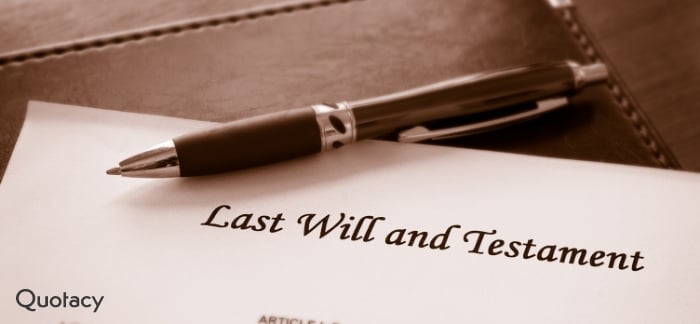How to Prepare for Death: 7 Tasks You Need to Complete

3 Crucial End-of-Life Plans to Finalize
Part of preparing for death is planning ahead for your family’s finances. Can they easily pay for your funeral? Will there be estate taxes? Can they continue their standard of living, or will they be thrown into financial turmoil?
Estate Settlement
Even if you aren’t worth millions of dollars, you still have an estate. An estate plan isn’t just for the rich or elderly.
The executor of your estate will be in charge of estate settlement. They’re responsible for collecting money owed to your estate, paying outstanding debts, and distributing the money left in the estate.
In addition to paying off credit card debt, auto loans, and personal loans, payments of debts owed will include any federal and state income, estate, and inheritance taxes. An estate has to be quite large to get hit with a federal estate tax, but even modest estates can get hit with a state estate tax.
The money to settle the estate comes from your assets. If you don’t have enough liquid funds, property will be sold to pay off these debts. This means your heirs inherit less.
One way to ensure your heirs inherit your assets is to get life insurance.
Life Insurance
Life insurance is included in your taxable estate, but it’s not taxed when paid out to your beneficiaries. Your heirs can use the policy’s death benefit to pay off your debt and estate taxes rather than sell sentimental assets to make those payments.
Term Life Insurance
Most families only need term life insurance. Term life insurance pays a death benefit if you die while the policy is inforce—term length options range from 10 to 40 years.
Term life insurance protects against the what-ifs in life. “What if I die suddenly in a car crash?” “What if I’m diagnosed with cancer?”
With term life insurance, your family receives a death benefit if you die too soon. The death benefit can be used to pay for end-of-life expenses and the everyday things your paychecks once covered.
Permanent Life Insurance
If you have a large estate or loved ones who will be financially dependent on you their entire life, then you’ll benefit from permanent life insurance. Permanent life insurance, whole life insurance being one of the most common, is designed to last your entire life. This policy will provide a death benefit when you die, not if you die.
Due to the tax benefits, permanent life insurance is often used for high-net-worth estate planning. It’s also a popular way to pay estate taxes and provide liquid inheritance to beneficiaries.
Because of the high premiums on permanent life insurance, the majority of families would benefit most from buying term life insurance while putting money towards emergency savings and retirement funds.
Unsure which type of life insurance is best for your situation? Learn more in our term versus whole life guide.
Funeral Arrangements
Some people have precise wishes regarding how they want to be laid to rest. Others don’t care much at all. Even if you’re the latter, consider documenting your preferred funeral arrangements so your loved ones don’t have to stress over it.
It’s recommended to state your wishes in both your will and living will. Tell the chosen executor of your estate or another trusted person about where your final wishes are documented.
Burial vs. Cremation Considerations
The first step in end-of-life preparation is choosing whether you’d rather be buried or cremated. The costs are significantly different between the two.
Average Burial Cost: $7,000 – $12,000.
Average Cremation Cost: $1,000 – $3,000. Cremation is far cheaper because no gravesite fees, caskets, cemetery fees, or headstones are involved.
If you choose to donate your body to science, this is often less expensive overall because the organization receiving your body pays for many expenses.
Funeral Considerations
Funerals can be held whether you’re buried, cremated, or donated. Funerals typically have four parts:
Visitation
Funeral
Committal
Reception
If there are specific things you want to be done at your funeral, tell your family. For example, people will often say they want a certain song to play or would prefer a charity donation instead of flowers.
Prepare for your death financially so your loved ones aren’t struggling to find money for a funeral. Here are some of the costs to consider*:
Non-declinable funeral service fee: $2,300 (covers the cost of planning, permit, death certificate paperwork, and administration fees)
Additional service fees: $1,400 (things like transporting the body to the funeral home and preparing the body)
Facility use: $515
Hearse: $350
Casket: $2,500 – $10,000
Vault: $1,572 (not always required)
*Dollar amounts are based on a study by the National Funeral Directors Association.
In addition to a funeral, people often gather together for a reception, memorial service, or celebration of life. This may include additional costs such as a venue, food, beverages, and music.
Find Life Insurance to Cover End-of-Life Plans
End-of-life planning relieves your family of a huge burden. As your loved ones are grieving your death, the last thing you want for them are financial struggles and arguments over your final wishes.
Preparing for End-of-Life Checklist:
Last Will and Testament
Durable Power of Attorney
Living Will
Healthcare Power of Attorney
Funeral/Burial Arrangements
Life Insurance
If you don’t already have life insurance, take time now and think about whether your family would be financially impacted if you suddenly died. You should have enough life insurance to replace your income and cover end-of-life expenses.
If you aren’t sure how much you need, try our free life insurance needs calculator. As an independent broker, Quotacy is your advocate in the life insurance buying process.
Unsure where to start? Read more: How to Buy Life Insurance Wisely: A Step-by-Step Guide






